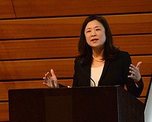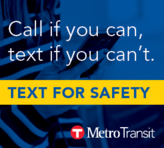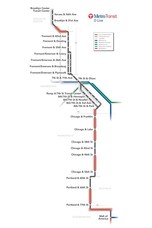|
In this Issue
So now we know: it won’t be the Vikings in Super Bowl LII.
But the Minneapolis Miracle is just one of the factors that is
whipping the region into a frenzy as we prepare to host the international
10-day long party for 1 million people.
While the Sunday, Feb. 4 game itself is only a couple
hours long, there will be Super Bowl-related activities around the region
in the 10 days prior to the big day. Events include paid and free ones. As Meet
Minneapolis says, “Hibernation has no place here” so plan to get out and enjoy
some of the many activities that will be going on throughout the region.
(Activities can be found online at www.mnsuperbowl.com,
www.minneapolis.org, and www.northmpls.com for events happening in
North Minneapolis.)
Throughout the 10-day event, Metro Transit will be the best
way to reach downtown Minneapolis with expanded schedules on key routes for
local commuters and additional schedules for Super Bowl related events. Specifically,
local routes 4, 10, 11, 17, 54, 535 and 724 will see expanded schedules. (Learn more about additional bus and train service. For updates on
detoured buses, look for signs at bus stops or sign up to receive Rider Alerts
by text or email at metrotransit.org/rider-alerts.)
With the exception of game day, METRO light-rail service
will continue to, from, and through downtown Minneapolis. Beginning at 6 p.m.
Friday, Feb. 2, through gameday, trains will not stop at U.S. Bank Stadium
Station but will serve all other stops. On game day, due to
security around the stadium and the proximity of the stadium to service for the
light-rail lines, the METRO Blue Line will be replaced with free buses, and
METRO Green Line service from Stadium Village to Target Field will be replaced with
free buses. Replacement buses will begin at 4 a.m. Feb. 4 and run
throughout the day, into the next morning, even as METRO light rail service
resumes following crowds thinning out post game. (Learn more about the local
impacts on our system)
Metro Transit’s service and system is one of the reasons the
Super Bowl Committee chose the Twin Cities to host Super Bowl LII. We are proud
that we are able to provide critical service for thousands of people who will
be visiting our region during this international event, while also continuing
to serve our regular riders to and from their daily destinations. It will be
busy around town, so be sure to give yourself extra time to get to where you
need to go.
Also, please read below for information on recent LCA
awards, upcoming events on proposed changes to SAC and the D-Line ABRT route,
and more.
As always, please don't hesitate to contact me if you have
any questions or concerns.
Cara
Metropolitan Council Member for District 8 (Northeast Minneapolis, Southeast Minneapolis, parts of South Minneapolis, and St. Anthony Village)
 Chair Alene Tchourumoff, Governor Mark Dayton, and more than 200 local officials and former Council members gathered January 25, 2018 to celebrate the 50th Anniversary of the Metropolitan Council at McNamara Alumni Center on the University of Minnesota campus.
A panel discussion between former Council Chairs Sue Haigh, Ted Mondale, and Curt Johnson, with moderator Brian McDaniel (former Council member), reflected on their service and discussed how to tackle the regional challenges of the future. Learn more about the role regional partnerships and long-term planning have played in building a high quality of life for the region.
In a speech marking the 50th Anniversary of the Metropolitan Council, Chair Alene Tchourumoff cautioned that the Twin Cities region could fall behind peer cities if leaders do not continue to make long-term investments in vital infrastructure like affordable housing and transportation.
|
Metropolitan Council seeks applicants for advisory committees
The Metropolitan Council encourages community members to apply for openings on several advisory committees. The application window is open for terms beginning in January 2018.
“Our advisory committees provide some of the best ways to influence regional decisions,” said Metropolitan Council Chair Alene Tchourumoff. “Each member partners with the Council members to provide a wide variety of viewpoints. I encourage people to apply – we need different voices at the table to assure our advisory committees reflect the communities we serve.”
Below is a list of openings:
The Transportation Accessibility Advisory Committee (TAAC) advises the Council on management policies for public transportation services in the region from the perspective of riders with disabilities. The committee has 16 members: a chair appointed by the Council, seven members selected by groups that advocate for seniors and people with disabilities, and eight community members who represent geographic districts in the region. At least half the members must be certified as eligible for ADA paratransit services and be active users of public transportation. Council-appointed members serve two-year terms.
Open Seats
- Chair - represents the entire seven-county region
- District E - includes the western half of Ramsey County and the western two-thirds of Anoka County. (Council Districts 9 and 10)
- District F - includes all of Washington County, the eastern half of Ramsey County and the eastern third of Anoka County. (Council Districts 11 and 12)
- District G - includes all of St. Paul and the very northern communities in Dakota County. (Council Districts 13 and 14)
- District H - the southern three-quarters of Dakota County and southeastern Scott County. (Council Districts 15 and 16)
How to apply
To apply, visit the Council’s website and fill out the new online application. (Some committees may also require applicants to answer supplemental questions.) For more information, or to submit your application though PDF, contact the Appointments Coordinator by email, U.S. mail or phone: 390 Robert St. N., St. Paul, 55101 or 651-602-1806.
The Metropolitan Council has awarded the City $6.1 million in Livable
Communities grants. The two largest awards are for mixed-use and mixed-income
developments. The Council awarded eight initiatives for brownfield clean up and
contamination investigation for redevelopment.
District 8
projects received LCA funding, including:
Bunge East Redevelopment--$73,500 for disposal of
contaminated soil for the development of mixed-income, including affordable
apartments.
Midtown Corner Senior Housing--$85,600 for disposal
of contaminated soil for development of affordable apartments and commercial
space. This project is part of the redevelopment of the former Rainbow Foods
near Lake Street and Minnehaha Avenue.
Malcolm Yards--$45,700 for contamination
investigation at a 17-acre site for potential development of housing,
commercial/industrial space and a regional stormwater treatment system. This
project is part of the Towerside Innovation District near Prospect Park.
Aeon Prospect Park--$382,000
in LCA Local Housing Incentives Account (LHIA) funding. This project includes
70 new apartment homes in the Prospect Park Towerside Innovation District, one
block from the Prospect Park METRO Green Line station. The project includes a
mix of affordability levels, market rate units, as well as supportive
housing for women-led households with children.
Minnehaha Commons--$250,000
in LCA LHIA funds. Funding will support construction of 43 studio apartments
for low-income 55+ adults who have experienced homelessness and other barriers
to accessing stable housing on the site of the former McMahon’s Pub on East
Lake Street at 30th Ave S.
Mino-bimaadiziwin - $207,900 for disposal of contaminated soil for development of affordable apartments with community wellness and office space.
38th Street Station project - $1,500,000 for the mixed use project adjacent to the 38th Street Station on the Blue Line.
Since the Livable Communities program became law in 1995,
the Council has approved grants totaling nearly $370 million to assist projects
that have created or retained more than 55,000 jobs, cleaned up 2,400 acres of
polluted property for redevelopment, created or preserved nearly 24,000
affordable housing units, and leveraged billions in additional public and
private funds.
Click see all the projects that received awards.
As a government entity, the Council has a statutory duty to transparently use state and federal funds for the benefit of the region. Not only does the Council strive to achieve this goal through formal means such as audits and legislative reports, we also seek to be easily accessible to all our customers and are continuously improving the ways we do so.
As the regional planning agency, wastewater system operator, housing authority, and largest public transit provider, the Council has investments in almost every corner of the region, but residents infrequently see or hear about them. With the Council’s new interactive investment maps, we’re hoping to make it easier for the public to learn about the Council’s work. Throughout 2017, Council staff has been building an online mapping tool to better demonstrate the diverse investments public dollars have helped spur in our region. Each Council district has a map, which is meant to be a high-level overview of Metropolitan Council investments within the district.
The goal of this project was to bring previously isolated transit, housing, and water investments into one simple, easily digestible tool for the public to utilize. I encourage you to explore the District 5 map using the link below and learn about the various investments the Council has in your city.
This current phase focuses on data and information the Council has previously shared in various places, but future phases of the project will include additional information and resources. The map will be updated on a quarterly basis, so check back in occasionally to see if changes are occurring in your area. Phase II will be taking place throughout 2018 with an expected launch in January 2019.
The District 8 investment map can be found here.
Metro Transit customers can now discreetly report suspicious or unwanted behavior through text messages.
Using the “Text for Safety” feature, customers are put in direct contact with trained Metro Transit staff who can respond by text and send Transit Police if needed.
The service is being introduced so individuals can seek help even if they don’t feel safe making a phone call. It is expected to be especially useful in harassment situations.
See details about the new text for safety feature.
|
|
 |
 Last fall’s elections led to a lot of change in District 8 communities, namely Minneapolis. On Monday, January 8, I was able to attend the public Minneapolis Inauguration Ceremony for Mayor Jacob Frey and the 13 members of the Minneapolis City Council. Congratulations to everyone and I look forward to working with them in the future.
On Monday, Jan. 15, I celebrated Martin Luther King Day at the Governor’s Council on MLK Day event hosted by Governor Dayton at the Ordway Theater. It was an inspirational morning that included a youth rally, musical acts, speakers, and an awards ceremony honoring Minnesotans who are making a difference for all of us. Being reminded of Dr. King’s championing social justice, civil rights, and economic empowerment is always a great way to start the work week.
On Thursday, Jan. 25, I attended the Met Council's celebration of its 50 year founding at an event, “Celebrating a Prosperous Region”. Chair Alene Tchourumoff delivered the State of the Region report, followed by a panel discussion.
Looking Ahead:
Tuesday, Feb. 6, MCES and Metro Cities convened a task force to look at improvements to the SAC program. Come hear about the proposed changes and provide feedback. We want to make sure the proposed changes will make the program easier for users to understand and use. The meeting is being held in the community room at Gandhi Mahal Restaurant located at 3009 27th Ave S, Minneapolis 55406.
Plans for the D Line (Emerson-Fremont-Chicago ABRT) are advancing, and a draft station plan with proposed station locations will be released on Feb. 5. There will be several opportunities to learn more about the project and provide input in February. Click for more information and to sign up for project email updates.
Saturday, Feb. 10, I will be attending the City of Minneapolis’s Community Connections Conference at the Minneapolis Convention Center. The free, day-long conference runs from 8:00am – 3:30pm and includes workshop sessions and a free lunch. I’m especially looking forward to sessions on Tenant Rights, Housing Habitability, and How Communities Can Support Renter Households and Demand Equity and Representation: Mobilizing for the 2020 Census. Check it out for yourself!
|
|